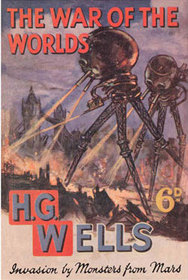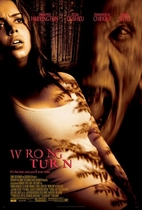Our editor-in-chief Nate Yapp is proud to have contributed to the new book Hidden Horror: A Celebration of 101 Underrated and Overlooked Fright Flicks, edited by Aaron Christensen. Another contributors include Anthony Timpone, B.J. Colangelo, Dave Alexander, Classic-Horror.com's own Robert C. Ring and John W. Bowen. Pick up a copy today from Amazon.com!
Cold Reads: War of the Worlds by H.G. Wells
As this first month of reviews comes to a close, some readers may find themselves scratching their skulls at this last selection of the horror genre's type five essentials. Certainly, I must be mistaken in including a novel that is solidly in the field of science fiction. "My God man, have you gone mad?!" I hear you screaming at your computer screen. Actually, I am indeed quite insane. However, I believe the true lunacy would be to dismiss H. G. Wells's tale of a terrifying alien invasion as a simple romp into the world of the scientifically fantastic. Wells imbues his story with a palpable fear that will have the readers shivering with genuine fright at the thought of mankind meeting its end at the cold hands of an alien invader.
Our nameless narrator relates the harrowing months of horror that Earth suffers following the descent of strange meteorites from Mars. The first cylinder lands near the narrator's home and, as the public casually marvels at the rock, the meteor opens to reveal strange creatures whose intentions seem less than friendly. As news of the men from Mars spreads across England, the country discovers the true purpose of the galactic travelers when the monsters unleash the power of their heat ray upon the terrified masses. Soon a titanic metal ship has emerged from the cylinder and its brothers soon join it in laying waste to the countryside. The narrator spends the length of the novel running all across the country as the seemingly unstoppable leviathans destroy everything that comes into their sight in order to claim the Earth for their own...
With such a cataclysmic and epic plotline, the scares come easily enough even without Wells's talent to sharpen those very real fears into true poignancy. Wells demonstrates his true brilliance though when he introduces his philosophical thoughts into the story. These do not bore the reader or seemingly come from nowhere; they are engaging, thought provoking, and scary as hell. Despite all the misery that is wracking his land and his own soul, the narrator cannot help but draw parallels between the bloodthirstiness of the Martians and the cruelty of his own human brethren. Humans have been known to wipe out entire species of animals from the face of the planet, he reflects. Why should these beings, who posses both a higher intellect and potential for deadly weaponry, have any sympathy for the lowly humans whom they see as mere ants underneath their gargantuan feet?
It seems no accident that the alien invaders hail from Mars, the planet that shares the name of the Roman god of war. The crimson color of the planet also symbolizes the blood of the human race that is spilled and the flames that consume the land. The Martians themselves lack any visible emotion and are purely driven by their base instincts of survival and domination. And, under the right circumstances, isn't this what we ourselves can be reduced to? What is the more terrifying thought? The idea that we are being removed from our mantles at the top of the food chain, given a reality check by these cold, calculating leeches who have come to rob the world of all life? Or is it the fact that our merciless executioners posses the same mentality and apathy towards life that we have had? Still convinced that this book has nothing to do with the horror genre?
The scenes involving the narrator's encounters with the massive panic that is sweeping the nation also offer very telling views into the human condition. The narrator witnesses people looting houses either for survival or pure greed, victims of horrible injuries trudging along the road, and storms of people stampeding over each other without a backward glance. In one chapter, the narrator realizes that the Martians are already wielding their greatest weapon against the human race. After demonstrating the awful power of their Heat-Rays and the poisonous Black Smoke, the Martians simply stand back and watch the fear generated by their warfare play out. They take a back seat and observe as we let the growing panic of the situation consume us, turning us into mindless animals scattering all over the place.
Fear can turn the most civilized of people into frenzied beasts, more capable of bringing about their own destruction than any monster from space. It seems grimly ironic that this actually occurred forty years later when radio listeners tuned into Orson Welles's report of a space invasion from Mars. The dramatized account seemed so genuine that people actually went into hysterics, creating a widespread panic over the fabricated extraterrestrial encounter. The story Welles had used to inspire his infamous broadcast? The War of the Worlds by a bloke named H. G. Wells. Are the hairs on your neck curling yet?
If all this horror based in reality is starting to get to you, do not fear. Wells knows how to create powerful scenes of good ol' genuine suspense to boot. Of special note is the narrator's first encounter with the Martian ships. Racing home in a horse-drawn wagon during a raging thunderstorm, he is flabbergasted to witness the metal monoliths stomping across the forests. It is a truly breathtaking scene, with the ships' menacing appearance only being able to be glimpsed in flashes of lightning and their giant footsteps matching in resonance with the booming clap of the thunder. They appear to be gods descended from the raging heavens, walking amongst the creatures of Earth. But these are not the benevolent deities who are looking to bring peace and prosperity. They are the vengeful beings whose goal is to smite out all who wrong them or dare stand against them. Another great scene is where the narrator, having just gotten into a fight with a priest inside a ruined house next to a Martian landing, hides inside a cramped coal closet as the slinking tentacle of the ship comes into the house. He watches in desperate anticipation as the snake-like appendage drags the priest's body away and then comes poking around the closet. It's the classic stalker-on-the-other-side-of-the-door scene, but Wells doesn't fail in creating tension with this tried and true scenario.
It is my hope that anyone who had doubted the inclusion of this novel into the pantheon of horror classics can now clearly see the terrifying potency that Wells' tale wields over the audience. However, there is nothing I can possibly say that will allow one to truly appreciate the catastrophic horror that Wells writes so vividly. If you're a horror fan who is looking for a book that will actually chill you and give you a disturbing introspective look into yourself, look no further than the novel presented here for examination. The War of the Worlds will give you enough scares to last a few lifetimes and allow you to see the monsters that inhabit this world and the worlds beyond.








